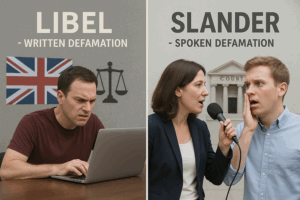Victim of defamation on social media: how to react?

On social media, a statement can quickly cross borders and reach a wide audience, exposing everyone’s reputation to serious legal risks. Online defamation differs from traditional defamation in its virality, permanence and ability to spread globally. Even a simple comment or share can engage the civil liability of its author. In this context, it is essential to seek the assistance of a solicitor specialising in defamation to assess the risks, gather evidence and implement the remedies provided for by British law.

- You have the right to demand the removal or deletion of defamatory content via social media reporting tools.
- You can request that the author cease and desist to prevent further publication.
- It is possible to bring a defamation action in courts to obtain financial compensation and recognition of the damage caused.
- You have the right to use legal defences if you are the author and can demonstrate truth, honest opinion or public interest.
Read on to understand the practical steps you can take and the legal protections available to you.
How does UK law define defamation online?
Understanding what counts as online defamation is the first step in protecting your reputation on social media.
What UK law considers as defamation?
In the UK, defamation is governed by the Defamation Act 2013, which sets out clear conditions for when a statement is legally defamatory:
- The statement is false or misleading.
- It is published to a third party, including posts, comments, or shares on social media platforms such as Facebook, Twitter, Instagram, or LinkedIn.
- It causes or is likely to cause serious harm to the victim’s reputation.
This applies equally to content posted online across social media and other digital media. The law strikes a balance between protecting personal reputation and preserving freedom of expression on open social platforms.
Defamation versus harassment or ordinary insults
Not every negative comment online amounts to defamation. Insults or harassment may be addressed under other laws, but do not necessarily affect a person’s reputation in a legal sense. The determining factor is actual or potential harm: if the attack only causes emotional upset without affecting professional or social standing, it falls outside the scope of defamation.
The law allows for expression that does not amount to reputational harm:
- Personal opinions and fair criticism: Expressing an opinion (“I don’t like this service”) is not the same as stating a false fact.
- Fact-based publications: Posts grounded in verifiable truth cannot generally be treated as defamatory.
- Humour, satire, or parody: Provided it stays within reasonable limits, parody or satire does not usually meet the threshold for defamation.
How to recognise online defamation?
Social media posts, tweets, videos or comments that spread false information and damage someone’s reputation are the clearest examples of defamation. Harm can affect both professional life, such as a person’s career or business credibility and personal standing in their community.
Importantly, responsibility does not stop with the original author: sharing or reposting defamatory material can also attract liability, the law considering each act of online publication as capable of causing further damage.
While traditional defamation involved newspapers, books, or printed media with limited circulation,social media defamation differs because of its:
- Virality: posts can be shared and commented on thousands of times within hours.
- Global reach: online content can reach an international audience instantly.
- Instant accessibility: anyone can access the content at any time, increasing the risk to the victim’s reputation.
This makes rapid action important, including sending a cease and desist letter or using the report functions on platforms to limit further dissemination.
Taking legal action for online defamation requires more than simply feeling wronged. Under UK law, the burden of proof lies with the claimant who must demonstrate that the publication was false, harmful, and communicated to third parties. On social media, this process presents unique challenges, but with reliable evidence and a clear strategy, it is possible to build a strong case:
- Screenshots should capture the full content, including usernames, profile pictures, and the date and time of publication.
- Saving the original URL is essential in case the post is deleted.
- Testimonies from individuals who have seen the content also strengthen the case by confirming its reach and impact on reputation.
In some cases, IT experts may be needed to trace anonymous accounts, recover deleted posts, or link a profile to a device or IP address.
Proving defamation on social media can be complicated due to anonymity, rapid content deletion, or hosting on servers outside the UK, which can make accessing data and establishing jurisdiction more difficult. These challenges make it essential to act quickly, preserve evidence carefully, and seek specialised legal advice at the earliest stage.
When an individual or organisation becomes a victim of online defamation, several options exist to protect their reputation and seek redress. These measures can be legal, by taking court action, or extrajudicial, aimed at stopping the publication and limiting its spread without going through a lengthy trial.
Extrajudicial measures
Before pursuing a court case, it is often possible to resolve the issue through quick and targeted actions :
- Cease and desist letters: a lawyer can send a formal notice to the author of the publication, demanding the immediate removal of the content and a commitment not to republish it.
- Reporting to platforms: social media sites have mechanisms to report defamatory content. Acting quickly can limit further dissemination and strengthen evidence of harm.
- Mediation or negotiation: in some cases, direct dialogue or discussions via a lawyer can resolve the dispute without initiating formal legal proceedings.
Legal measures
When extrajudicial actions are insufficient, legal proceedings can be used to obtain formal redress. Options include:
- Defamation claims: the victim can bring the case before courts to seek compensation for the harm suffered. The judge will examine digital evidence and testimonies to determine whether the publication is indeed defamatory.
- Financial compensation and injunctions: if defamation is established, the victim may receive damages and an injunction ordering the removal of the content and prohibiting further defamatory publications.
What defences exist if you are accused of defamation?
If you are accused of defamation on social media, UK law provides several defences to challenge liability or reduce potential consequences:
- Truth of the facts: proving that the statements published are accurate negates a defamation claim, even if they caused harm. Evidence can include documents, records, or reliable witness testimony.
- Honest opinion or fair comment: comments clearly expressed as opinions, rather than statements of fact, are protected if made sincerely and reasonably.
- Publication in the public interest: sharing information that is genuinely important to the public may be defensible, provided the author acted responsibly and the publication serves a legitimate public interest.
Do I need a solicitor for an online defamation case?
On social media, a defamatory post can quickly have serious impacts on reputation, whether you are a victim or the accused. In this context, consulting a solicitor specialising in defamation is strongly recommended to assess risks, secure evidence, and determine the best course of action.
If you are a victim of defamation, a solicitor can help you to:
- Assess the harm caused to your reputation and determine whether legal action is justified.
- Collect and preserve digital evidence such as screenshots, URLs, timestamps, and witness statements.
- Implement extrajudicial measures such as sending cease and desist letters, reporting the content to platforms, or mediating with the author.
- Pursue legal action if necessary to obtain damages or an injunction to remove the defamatory content.
If you are accused of defamation, a solicitor can help you to:
- Identify possible defences including truth, honest opinion, or publication in the public interest.
- Draft appropriate responses to cease and desist letters or legal notifications.
- Mitigate risks of financial penalties and reputational harm online.
- Negotiate or prepare a defence in court if the case proceeds to litigation.
Even if you believe the accusation is minor or unfounded, professional legal guidance prevents mistakes and protects your reputation. Given the wide reach of social media, acting promptly is essential.
FAQs
Can I issue a cease and desist letter to get a post removed?
Yes, you can instruct a solicitor to send a cease and desist letter demanding removal of defamatory content. It signals your intent to take legal action if the post is not deleted.
Should I take action if it’s just my opinion, not a statement of fact?
Generally, opinions are not defamatory if clearly expressed as such. Legal action is usually unnecessary unless the comment implies false facts that harm your reputation.
Can I sue if someone defamed me via Facebook comments?
Yes, you can bring a defamation claim for harmful comments on Facebook. The same rules apply as for other online publications: the statement must be false, published to a third party, and cause serious harm.
Defamation on social media can quickly damage personal and professional reputation, so timely action and legal guidance are essential. Acting quickly and knowledgeably helps limit harm and regain control over your online reputation.
Take action against online defamation!
If a defamatory post is affecting you, contact a specialist solicitor listed on Qredible’s network to remove it and protect your reputation.
KEY TAKEAWAYS:
- Online defamation differs from traditional media due to virality, permanence, and global reach.
- Collect and preserve digital evidence such as screenshots, URLs, timestamps, and witness statements to prove your case.
- Extrajudicial measures like cease and desist letters or reporting to platforms can stop harmful content quickly.
- Defences such as truth, honest opinion, or public interest are available if you are accused of defamation.
Articles Sources
- legislation.gov.uk - https://www.legislation.gov.uk/ukpga/2013/26/contents
- legislation.gov.uk - https://www.legislation.gov.uk/ukpga/2013/26/section/2/notes
- assets.publishing.service.gov.uk - https://assets.publishing.service.gov.uk/media/5a7c606440f0b626628aba0b/defamation-guidance.pdf
- gov.uk - https://www.gov.uk/government/news/defamation-act-reforms-libel-law
Do you need a solicitor?
Find a solicitor on Qredible in just a few easy steps
















